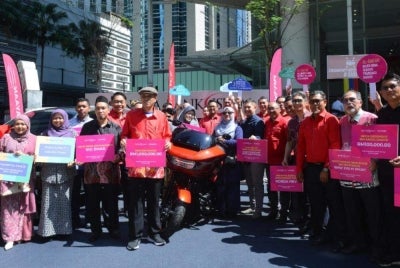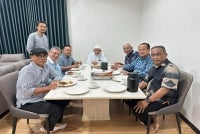'3D' among reasons why graduates steer away from agriculture - Rubiah

SEREMBAN - Dirty, dangerous and difficult (3D) are the main reasons why not many graduates choose the agriculture field despite it offering many services in its own class.
Rural and Regional Development deputy minister Datuk Rubiah Wang said graduates must change their perception as the agriculture field has widened its branches.
"If you look at the current scenario, the response from students in the agriculture field is declining. Undoubtedly, the field requires an individual to stay under the heat of the sun.
"But under our agency, primarily through the University College Agroscience Malaysia (UCAM) we try to attract students through the multitude of courses offered," she said in a press conference after the 20th UCAM Convocation Ceremony in the Universiti Sains Islam Malaysia (USIM) Tuanku Canselor Hall here on Tuesday.
Also present at the convocation ceremony was UCAM Chief Executive Faizatul Akmar Hisan, where 300 graduates who received awards in undergraduate, diploma, certificate and executive programmes were celebrated.
She said in her speech that Agroscience-based education could offer great opportunities for the development of the agricultural and food production sectors.
Rubiah said it would contribute towards the increase in the nation's economy and guarantee the people's welfare.
"Along with the development of the agricultural function, UCAM offers various study fields that emphasise the importance of Agroscience as the main leader in the provision of services in the education sector.
"The agrofood agriculture sector, for example, also requires technical expertise in the field of information technology and engineering because the use of modern technology such as drones and the Internet of Things (IoT) has diversified employment opportunities in the agricultural sector," she said.
Rubiah explained UCAM's existence could counter the perception that agriculture was less attractive as a career.
"UCAM has offered Agroscience studies to Agronomist and Agropreneur not only among students in the institutions full time, but those involved in rural communities," she said.
Thus far, she said UCAM had produced 5,268 graduates in the agroscience and agropreneur who contributed to improving the economic environment in various fields to support the agricultural sector chain.
"The existence of these jobs has aided in the decline of unemployment and positively affected the nation's economy as a whole.
"UCAM's role in developing the economy and identity of rural communities have successfully proven through the involvement of the halal industry where accreditation was essential to meet the needs and wishes of Muslim consumers," she said.
Rubiah said UCAM had trained over 500 entrepreneurs under the Rubber Industry Smallholders Development Authority (Risda) and 150 industry parties to obtain halal certification from the Malaysian Islamic Development Department (Jakim).
She said UCAM also prepared the Food Handling Training Centre recognised by the Health Ministry to conduct the Malaysian Safety Handling Course for traders who run food-based businesses.
"I'm confident and believe that UCAM has the potential to grow and become centre of excellence in agricultural research and learning.
"The strong support from several parties and increasing the relevant academic programme, UCAM could attract more talented students and develop an innovative agriculture field in the nation," she said.
She added UCAM expanded its operations in Technical Education and Vocational Training (TVET) to meet the needs of the job market, particularly in the fields of Agriculture, Entrepreneurship and Technopreneurship, Information Technology and Creative arts and Multimedia.
"In addition, the implementation of the Special TVET for Women with the recruitment of 15,000 women in this program will act as the first cross TVET program through collaboration between Universiti Teknikal Malaysia Melaka (UTEM) and UCAM.
"I am confident that this Women's Special TVET program will be able to be a catalyst and the best example for additional Higher Education Institutions to offer cooperation programs that are a win-win situation for technical and vocational training through the introduction of this cross-university initiative," she said.
Download Sinar Daily application.Click Here!















